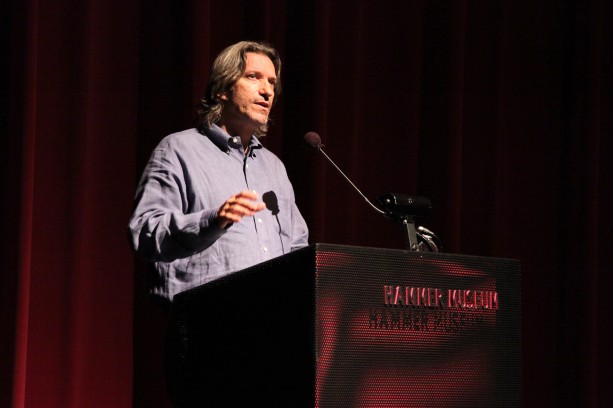
John Prendergast opened his talk Tuesday at the Hammer Museum by challenging the evening’s provocative title, “Can Mentors Save Lives?” The human rights activist humorously conceded: “The title of this event was a bit daunting. Can mentors save lives? Can’t we just sort of raise the kid’s math grade from a C to a B?”
Prendergast, renowned for his advocacy on behalf of Darfur as the founder of the Enough Project, which seeks to end genocide and crimes against humanity, has inspired people to try to put a stop to mass killings around the world. But closer to home, he admitted to worries that he’d fail to meet the evening’s promise if he couldn’t list five kids who were saved through mentoring.
“But then I thought to myself,” Prendergast added, “What does ‘save’ mean anyway?” And, for that matter, when assessing mentoring, “Who is saving whom?”
 That is one of the themes Prendergast explores in Unlikely Brothers: Our Story of Adventure, Loss and Redemption, the book he co-authored with Michael Mattocks, a young man Prendergast mentored whose family got caught up in the “underworld of the D.C. homeless shelter system” but who is now a happily married bus driver in the nation’s capital.
That is one of the themes Prendergast explores in Unlikely Brothers: Our Story of Adventure, Loss and Redemption, the book he co-authored with Michael Mattocks, a young man Prendergast mentored whose family got caught up in the “underworld of the D.C. homeless shelter system” but who is now a happily married bus driver in the nation’s capital.
However, if he could write the book all over again, Prendergast said he would divide it into four chapters: fathers, brothers, war and wives. The first chapter would highlight the relationship that Prendergast and Mattocks had with their respective fathers. In the second chapter, Prendergast would recall Mattocks’ “moonbeam smile” the first time they met at a homeless shelter in Washington D.C. When social services threatened to split Mattocks’ family apart, Prendergast, then 21, took him and two of his brothers to his Philadelphia home for the summer. “I can remember some terrible nights of attempted cooking episodes and frantic calls to friends saying ‘Can you rescue us from my latest catastrophe?’” But it was at that point that he started considering the Mattocks brothers as family.
Chapter three, a grimmer chapter, would be entitled “War.” Prendergast recalled the time period in which he fell out of touch with Mattocks. “I was learning more about what happened in Africa. My first visual picture was the Ethiopian famine. It hit me like a tornado. I decided I have to go. I have to understand what’s happening there.” And while Prendergast was in Africa pursuing his new career, Mattocks was experiencing a war of his own back home. Prendergast described Mattocks’ road to becoming a drug dealer as “chilling” and expressed his remorse for letting his little brother down in his moment of need.
Redemption
 Chapter four, the chapter Prendergast likes best, would be called “Wives.” “This chapter, neither of us saw coming a couple of decades ago. We are not only unlikely brothers, but we were definitely unlikely husbands,” he said as he fondly recalled the crucial meeting between Mattocks and his wife Nikki.
Chapter four, the chapter Prendergast likes best, would be called “Wives.” “This chapter, neither of us saw coming a couple of decades ago. We are not only unlikely brothers, but we were definitely unlikely husbands,” he said as he fondly recalled the crucial meeting between Mattocks and his wife Nikki.
Returning to the question of whether mentors can save lives, Prendergast said, “So I don’t know at the end of the day whether we saved each other or not, but I do know that we both played absolutely critical roles in each other’s paths to redemption. ”
That sounds at least as good as a B in math, no?
Advice For Mentors
 During the question and answer session, several members of the Zócalo audience shared their personal experiences as mentors, including the fear of not having enough time or the struggles of getting their mentees to open up. Prendergast offered helpful advice, urging those interested in becoming mentors to not worry about the limits and guidelines of a particular program. He noted that the key is to plant seeds of unconditional love early on, and to be a consistent figure in a child’s life. “It’s mostly all about self-esteem,” he says, “If you believe in a kid and the kid feels that, it makes all the difference.”
During the question and answer session, several members of the Zócalo audience shared their personal experiences as mentors, including the fear of not having enough time or the struggles of getting their mentees to open up. Prendergast offered helpful advice, urging those interested in becoming mentors to not worry about the limits and guidelines of a particular program. He noted that the key is to plant seeds of unconditional love early on, and to be a consistent figure in a child’s life. “It’s mostly all about self-esteem,” he says, “If you believe in a kid and the kid feels that, it makes all the difference.”
Prendergast then urged people to step up now more than ever. “In this moment we’re in, you would literally have your head in the sand to believe that we’re not going to see hemorrhaging in social programs over the next decade at the federal and state municipal levels… I hope people will have that kind of leadership here because it’s not going to come from the state at this point.”
We’re going to have to take care of each other, was Prendergast’s takeaway, as much at home as in the global village.
For full video, please click here.
For event photos, please click here.
To read about the effects mentors have had on the lives of four successful Angelenos, please click here.
*Photos by Aaron Salcido.




Send A Letter To the Editors